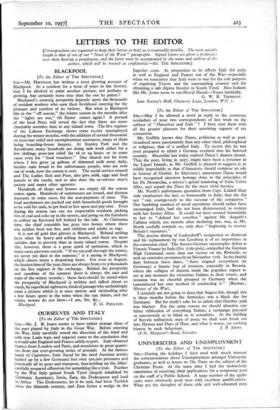[To the Editor of THE SPECTATOR.]
SIR,—May I be allowed a word in reply to the courteous rejoinders of your two correspondents of last week on the subject of " Ourselves and Italy " ? I have seen them with all the greater pleasure for their unwitting support of my contention.
Mr. Griffith knows that Dante, politician as well as poet.
visualised more passionately than any other ideal, philosophical or religious, that of a unified Italy. To secure this he was even prepared to admit a German overlord into his beloved country. Mussolini has today realised Dante's dearest dream. That the poet, living in 1937, might have been a prisoner in the Lipari Islands, as Mr. Griffith is pleased to suggest, is as wildly improbable as that d'Annunzio should compose an ode in honour of Giolitti. In Abyssinia's annexation Dante would have recognised sincerest homage done to the principles of his De Monarchia, a mystic's genial rendering of Italia Ueber Alles, and repaid the Duce by the most vivid heroics.
Mr. North's unfortunate quotation from Capt. Liddell Hart only emphasises the fact, so honourable to Italy, that she did not "run courageously to the succour of the conqueror." Our fumbling conduct of naval operations should rather have encouraged Italy, had she not been disinterested, to remain with her former Allies. It could not have seemed formidable to her to "defend her coastline" against Mr. Asquith's Cabinet which, ten months after declaring war, was, as Mr. North usefully reminds us, only then "beginning to muster Britain's resources."
The precise dating of Ludendorff's resignation or dismissal
and his replacement by von Lossberg is of no importance in the connexion cited. The Austro-German catastrophic defeat at Vittorio Veneto by Italy (Oct. 27th-3oth), compelled the German High Command, more than our victory on the Rill:if-acne, to seek an armistice prematurely on November I ith. In the fateful days between these dates, "there reigned everywhere (in Germany) a frantic fear of invasion, especially in Bavaria: where the collapse of Austria made the populace expect to see at any moment the victorious Italians in their streets, and invasion was no cheerful prospect to Germany when she remembered her own method of conducting it." (Buchan : History of the War).
I certainly am not going to deny that August 8th, though this is three months before the Armistice, was a black day for Germany. But for truth's sake let us admit that October 30th was blacker. For the same reason we should abandon our bitter vilification of everything Italian, a campaign pursued so rancorously as to blind us to actualities. At the bidding of fiercely militaristic men of peace we shall soon break out into Hymns and Days of Hate, and what is worse, see nothing
bizarre in such behaviour. J. B. JONES. 18 Sr. Margaret's Road, Swindon.










































 Previous page
Previous page